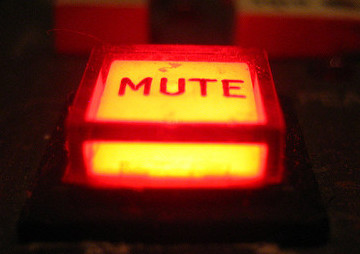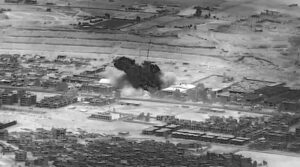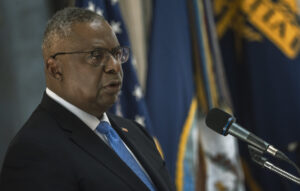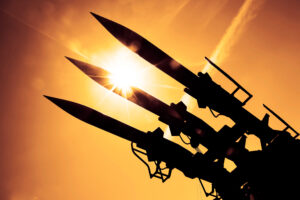Why It’s So Hard for Members of the Military to Speak Out
Assuming that many privates and generals have complicated, often highly critical feelings about various crises of war-making, why don’t they ever express them publicly? Jeremy Keith / CC-BY-2.0
1
2
3
Jeremy Keith / CC-BY-2.0
1
2
3
America used to think differently. Our founders considered a standing army to be a pernicious threat to democracy. Until World War II, they generally preferred isolationism to imperialism, though of course many were eager to take land from Native Americans and Mexicans while double-crossing Cubans, Filipinos, and other peoples when it came to their independence. If you doubt that, just read War is a Racket by Smedley Butler, a Marine general in the early decades of the last century and two-time recipient of the Medal of Honor. In the present context, think of it this way: democracies should see a standing military as a necessary evil, and military spending as a regressive tax on civilization — as President Dwight D. Eisenhower famously did when he compared such spending to humanity being crucified on a cross of iron.
Chanting constant hosannas to the troops and telling them they’re the greatest ever — remember the outcry against Muhammad Ali when, with significantly more cause, he boasted that he was the greatest? — may make our military feel good, but it won’t help them see their flaws, nor us as a nation see ours.
6. Loss of the respect of peers: Dissent is lonely. It’s been more than a decade since my retirement and I still hesitate to write articles like this. (It’s never fun getting hate mail from people who think you’re un-American for daring to criticize any aspect of the military.) Small wonder that critics choose to keep their own counsel while they’re in the service.
7. Even when you leave the military, you never truly leave: I haven’t been on a military base in years. I haven’t donned a uniform since my retirement ceremony in 2005. Yet occasionally someone will call me “colonel.” It’s always a reminder that I’m still “in.” I may have left the military behind, but it never left me behind. I can still snap to attention, render a proper salute, recite my officer’s oath from memory.
In short, I’m not a former but a retired officer. My uniform may be gathering dust in the basement, but I haven’t forgotten how it made me feel when I wore it. I don’t think any of us who have served ever do. That strong sense of belonging, that emotional bond, makes you think twice before speaking out. Or at least that’s been my experience. Even as I call for more honesty within our military, more bracing dissent, I have to admit that I still feel a residual sense of hesitation. Make of that what you will.
Bonus Reason: Troops are sometimes reluctant to speak out because they doubt Americans will listen, or if they do, empathize and understand. It’s one thing to vent your frustrations in private among friends on your military base or at the local VFW hall among other veterans. It’s quite another to talk to outsiders. War’s sacrifices and horrors are especially difficult to convey and often traumatic to relive. Nevertheless, as a country, we need to find ways to encourage veterans to speak out and we also need to teach ourselves how to listen — truly listen — no matter the harshness of what they describe or how disturbed what they actually have to say may make us feel.
Encouraging Our Troops to Speak More Freely
Perpetual war is a far greater threat to democracy in our country than ISIS, Russia, or any other external threat you want to mention. To again quote former President Eisenhower, who as supreme commander of Allied forces in World War II had learned something of the true nature of war, “Only Americans can hurt America.”
The military and the entire apparatus of the burgeoning national security state should exist for a single purpose: to defend the country — that is, to safeguard the Constitution and our rights, liberties, and freedoms. When it does that, it’s doing its job, and deserves praise (but never worship). When it doesn’t, it should be criticized, reformed, even rebuilt from the ground up (and in more modest, less imperial fashion).
But this process is unlikely to begin as long as our leaders continue to wage war without end and we the people continue to shout “Amen!” whenever the Pentagon asks for more weapons and money for war. To heal our increasingly fractured democracy, we need to empower liberty and nurture integrity within the institution that Americans say they trust the most: the U.S. military. Dissenting voices must be encouraged and dissenting thoughts empowered in the service of rejecting the very idea of war without end.
Some will doubtless claim that encouraging patriotic dissent within the military can only weaken its combat effectiveness, endangering our national security. But when, I wonder, did it become wise for a democracy to emulate Sparta? And when is it ever possible to be perfectly secure?
William J. Astore is a retired lieutenant colonel (USAF) and a TomDispatch regular. He taught history for fifteen years at military and civilian schools and blogs at Bracing Views.
Follow TomDispatch on Twitter and join us on Facebook. Check out the newest Dispatch Book, Nick Turse’s Next Time They’ll Come to Count the Dead, and Tom Engelhardt’s latest book, Shadow Government: Surveillance, Secret Wars, and a Global Security State in a Single-Superpower World.
Copyright 2016 William J. Astore Your support matters…Independent journalism is under threat and overshadowed by heavily funded mainstream media.
You can help level the playing field. Become a member.
Your tax-deductible contribution keeps us digging beneath the headlines to give you thought-provoking, investigative reporting and analysis that unearths what's really happening- without compromise.
Give today to support our courageous, independent journalists.






You need to be a supporter to comment.
There are currently no responses to this article.
Be the first to respond.